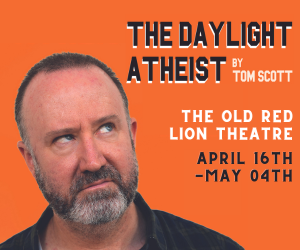Attila the Stockbroker began performing poetry in the 1980s, and since then has toured the world. He has returned to the Edinburgh Festival for the first time in twenty years for the release of his autobiography, Arguments Yard.
I’m never going to be sucked into the corporate-entertainment system.
What is your history with the Edinburgh Fringe?
I started as Attila the Stockbroker 1980, and did every Edinburgh Fringe from ’82-‘96. When we started, I played the Assembly Rooms for 70% of the door fee. It was run by a bunch of hippies.
After that I played a venue called Cowgate Hall, and then at Marcos Leisure Centre. We always wanted to play the hippest venue, and we ended up getting good reviews, as well.
Why did you stop coming?
I treat my work as a very DIY thing, but I’m never going to be sucked into the corporate-entertainment system. That is what happened to the Fringe. I was told that I had to pay to perform. Edinburgh is just another gig, it isn’t different from any others. The only difference is that there are loads more people here. It’s not different to Glastonbury. Music festivals are my bread and butter. After 1996 I stopped coming to Edinburgh.
Why did you decide to come back?
This year I was asked to talk about my book at the Edinburgh International Book Festival, and I thought that was great. From that, I learned about the PBH Free Fringe, and I thought it was brilliant. It was taking it back to the roots of what the Fringe should be.
Culture should be available to all, no matter what you can pay. People are good, and if they enjoy the show they will give you the money.
You change the pieces that you perform each night in Arguments Yard. How do you choose them?
I’ve got about eleven hours of material. I will so some of the same things every night, but I can change it around. I’ve been doing this for so long I know from an audience what it will be like. I started off shouting poetry at pissed punks and skinheads in 1980, and very soon was targeted by Nazis. As a result the vagaries of an Edinburgh Fringe audience pass me by.
What do you like your performances to be like?
I enjoy being funny, but I like being serious as well. Engaging with an audience on important subjects, with entertainment in the widest sense of the term. This is why I love the resurgence of spoken word. When I started in 1980 there was no comedy scene. There was alternative cabaret. When comedy got bigger, some poets decided to go down that path, Phil Jupitus being the most obvious example. But now there has been an explosion in the spoken-word scene, and I love it.
You’ve seen many transformations in live poetry, one of which was the development of Slam Poetry.
A huge great pile of fetid elephant bollocks that have been left to rot for a while with maggots, and then been infested by Tory ideology. That is slam poetry. On the other hand, the idea of open mics for poetry is fantastic. But at slams, instead of doing what they want to do, poets do what they think will get the biggest cheer.
I can’t judge fellow poets. I’m as honest as the day is long, and I will give my opinion. “Tough on rhyme, tough on the causes of rhyme.”
What makes good performance poetry?
The ability to write really good words and perform them well. You’ve got to do those two things simultaneously. I’ve seen people who have good performance, but I don’t remember the words. The key is managing to get the performance and the words well, so it works both on the page and on the stage.
When poetry started off anyone could do it. Even for Punk Rock you needed to learn three chords. For poetry you just need your voice. I’m seeing a lot of young people nowadays, and their work is excellent.
You can follow Attila on Twitter at @AtilaStokbroka. Arguments Yard is on until the 20th August at Silk (Venue 444), 18:20-19:20. Full Edinburgh listing: http://www.broadwaybaby.com/shows/attila-the-stockbroker-presents-his/713303










